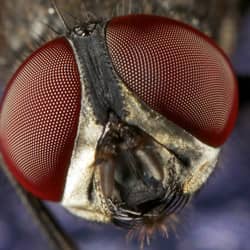What Are Overwintering Pests? (Plus, How To Prevent Them)
November 28, 2014

Some creatures hibernate during the winter, like bears, bats, bees, etc. But most creatures do what is called overwintering. It simply means to make it through winter in whatever way possible. For some, food isn't even required. Many bugs go into a low energy state called diapause in which the body consumes its own fat resources. That is why you'll see stink bugs and box elder bugs slowly creeping along your window sills and curtains. They're conserving energy so they can make it through the winter.
In nature, bugs will burrow into the ground, hide under leaves, tuck behind bark, slither into a stump, or find a nice cave to shelter themselves from the cold, winter temperatures. To bugs, your home is just another tree with bark or toasty warm cave. That's why they come every year, like a plague.
Most overwintering pests, like cluster flies, lady bugs, box elder bugs and stink bugs aren't a threat to you and your family. They're just a pain to have around. But fortunately, you don't have to have them around. Here are a few tips on how to prevent the unwelcome guests.
-
Make sure all your screens are up to snuff. If you don't want overwintering pests in your home, it is a good idea to replace or repair door and window screens.
-
It doesn't take much for a bug to crawl under your door or between two sliding doors, so check your weather stripping and door sweeps to make sure they are in place and undamaged.
-
Cover any openings or vents with window grade screening.
-
Use a caulking gun to fill in gaps around window frames, light fixtures, pipes, air conditioning units, and gaps in siding. It doesn't take much of a crack for a bug to squeeze in.
-
If you're still getting bugs in your home after steps 1-4 or if you want to get rid of unsightly bugs crawling around on your exterior walls, consider having a professional come and spray. Many times, bugs can get in through gaps and cracks in your roof line. Professionals have long hoses that can reach those areas and cover them with a treatment that kills and repels bugs.
-
Some homes, especially if they're old, need extra protection at the foundation. A perimeter spray is the added protection needed to make your home 100% bug-proof. These sprays are EPA tested and approved. Professionals only use a limited and focused amount that is necessary to arrest your pest issues.
When bugs seek to overwinter, let them do it in nature where they belong. Seal up your home and deter bugs from choosing your house as their house of safety from the cold. Then you won't have them driving you crazy all winter long!
For Immediate Assistance Call (888) 324-7025
 Subscribe to blog
Subscribe to blog
- Recent Blog Posts
- March 19, 2024 - What To Do If You Spot A Bee's Nest On Your Western Massachusetts Property
- March 17, 2024 - Is Professional Squirrel Control Necessary In Hartford?
- March 17, 2024 - Earwig Control Made Simple For Homeowners In Western Massachusetts
- Categories
- Ants - (25)
- Bed Bugs - (62)
- Birds - (10)
- Biting Insects - (7)
- careers - (1)
- Carpenter Ants - (5)
- Carpenter Bees - (6)
- Carpet Beetles - (12)
- Clover Mites - (7)
- Cockroaches - (30)
- Tags
- cockroaches in greenfield - (1)
- commercial bird control in ma and ct - (1)
- property inspection - (1)
- fruit flies in western ma - (1)
- moisture problems - (1)
- preventing bed bugs - (1)
- western mass carpenter ants - (1)
- zika virus - (1)
- flea and tick prevention - (1)
- signs of cockroaches - (1)
- View All Tags




